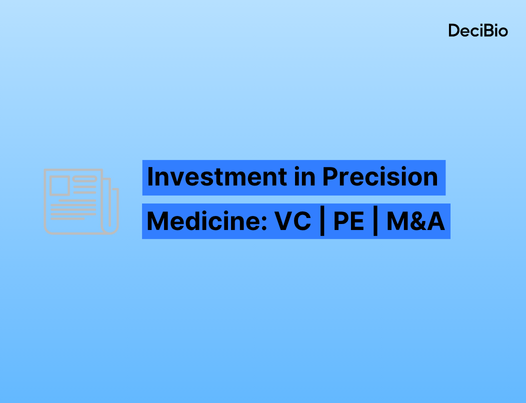Highlights & Summary
As we wrap up 2024, it’s clear that AI in healthcare continues to gain momentum. December brought a flurry of activity, most notably from an unusually high number of new major partnerships in drug discovery, as well as advancements in diagnostics and healthcare solutions. Here's a look at the key developments that shaped the close of the year.
AI in Drug Discovery
1 | BioAge and Novartis Partner to Target Aging-Related Diseases with AI and Longevity Data | Partnership
2 | Insitro Earns $25M Milestone for Advancing ALS Genetic Target with Bristol Myers Squibb | Partnership
3 | AI Proteins Partners with Bristol Myers Squibb on $400M Miniprotein Therapeutics Collaboration | Partnership
4 | CZI Launches AI Platform to Democratize Access to Biological Models and Data | Product Launch
5 | Gilead and Terray Collaborate to Advance AI-Driven Small Molecule Therapeutics | Partnership
AI in Diagnostics
1 | Siemens Healthineers Unveils Acuson Sequoia 3.5 with AI Abdomen for Enhanced Imaging and Diagnostics | Product Launch
2 | UK’s MHRA Launches AI Airlock Pilot to Advance Regulation of AI-Powered Medical Devices | Regulatory
3 | Philips and icometrix Collaborate on AI-Powered Brain Imaging for Neurological Care | Partnership
4 | AI Algorithm Speeds Up Rare Disease Diagnosis by Identifying Hidden Patterns | New Research
5 |Philips Launches AI-Enhanced CT 5300 to Optimize Imaging Workflows and Diagnostics | Product Launch
AI in Healthcare
1 | Suki Integrates Google Cloud AI to Streamline Clinical Workflows with New Features | New Product
2 | SandboxAQ Secures $300M to Scale AI and Quantum Solutions Across Industries | Fundraising
3 | Congress Releases Bipartisan Blueprint for Responsible AI Innovation and Regulation | Regulation
4 | Cedars-Sinai Invests $6M in Amae Health to Expand Integrated Mental Health Care Model | Fundraising
5 | Tuva Health Launches $5M Open-Source Platform to Transform Healthcare Data Analytics | Fundraising
AI in Drug Discovery
1 | BioAge and Novartis Partner to Target Aging-Related Diseases with AI and Longevity Data | Partnership
BioAge Labs and Novartis announced a multi-year collaboration to discover therapeutic targets for age-related diseases using BioAge’s human longevity data and Novartis’ expertise in exercise biology. BioAge will receive up to $20M in upfront and research funding, with potential milestones totaling $530M. The partnership aims to identify and develop novel drug targets to treat aging-related conditions, leveraging BioAge’s AI-driven platform built on decades of human aging data. Both companies can independently advance and commercialize the discoveries.
2 | Insitro Earns $25M Milestone for Advancing ALS Genetic Target with Bristol Myers Squibb | Partnership
Insitro received $25 million in milestone payments from Bristol Myers Squibb for identifying and validating the first novel genetic target for ALS under their 2020 collaboration. Insitro's machine learning-enabled platform, incorporating engineered ALS cell lines, imaging capabilities, and pooled optical screening, identified genetic targets that may transform ALS treatment. The first target is now advancing into drug discovery, with other targets under study. Insitro is eligible for over $2 billion in future milestones and royalties as part of the collaboration.
3 | AI Proteins Partners with Bristol Myers Squibb on $400M Miniprotein Therapeutics Collaboration | Partnership
AI Proteins has partnered with Bristol Myers Squibb in a research collaboration to develop novel miniprotein-based therapeutics using AI Proteins’ proprietary platform. The agreement includes an upfront payment, with potential milestone payments and royalties valued at up to $400 million. AI Proteins will design and optimize miniproteins, offering benefits like improved tissue penetration and rapid clearance compared to traditional therapies, targeting two undisclosed areas with options for additional targets.
4 | CZI Launches AI Platform to Democratize Access to Biological Models and Data | Product Launch
The Chan Zuckerberg Initiative (CZI) has launched an AI platform to centralize and simplify access to biologically relevant AI models and datasets, aiming to lower barriers for scientists and accelerate biological research. The platform includes curated models, tutorials, and datasets for applications like subcellular imaging and transcriptomics, with tools to support biologists and machine learning researchers in improving and applying these models. CZI plans to expand the platform with benchmarks, learning resources, and additional features to foster collaboration and advance virtual cell modeling for deeper biological insights.
5 | Gilead and Terray Collaborate to Advance AI-Driven Small Molecule Therapeutics | Partnership
Gilead Sciences and Terray Therapeutics announced a collaboration to discover and develop small molecule therapies using Terray’s AI-driven tNova platform. Gilead will select targets, with Terray optimizing compounds for discovery. Gilead retains exclusive options to license, develop, and commercialize resulting products. Terray will receive upfront and milestone payments, with royalties on net sales. The partnership leverages Terray’s computational and experimental capabilities alongside Gilead’s drug development expertise to address complex therapeutic challenges.
AI in Diagnostics
1 | Siemens Healthineers Unveils Acuson Sequoia 3.5 with AI Abdomen for Enhanced Imaging and Diagnostics | Product Launch
Siemens Healthineers has introduced the Acuson Sequoia 3.5 ultrasound system update, featuring AI Abdomen, a first-of-its-kind tool for automatically labeling and measuring abdominal organs, reducing sonographer strain and standardizing diagnostics. The update also includes the HLX transducer for improved breast and musculoskeletal imaging, enhancing detection accuracy and reducing false negatives. Additionally, liver assessment tools such as Ultrasound Derived Fat Fraction (UDFF) and Auto Point Shear Wave Elastography (Auto pSWE) allow precise measurement of liver stiffness and steatosis. The system is FDA-cleared, CE-marked, and globally available.
2 | UK’s MHRA Launches AI Airlock Pilot to Advance Regulation of AI-Powered Medical Devices | Regulatory
UK’s Medicines and Healthcare products Regulatory Agency (MHRA) has launched the AI Airlock pilot scheme to test and improve regulatory approaches for AI-powered medical devices, aiming to bring innovative technologies to the NHS faster and more safely. Five selected devices focus on improving care in areas such as COPD, cancer management, radiology, and clinician decision-making. The sandbox approach enables manufacturers to collect regulatory evidence in a supervised environment, addressing challenges like AI model drift. Findings from the pilot, to be announced in 2025, will shape future UK regulatory frameworks for AI in healthcare.
3 | Philips and icometrix Collaborate on AI-Powered Brain Imaging for Neurological Care | Partnership
Philips and icometrix have partnered to integrate icometrix's AI-powered brain imaging software into Philips' BlueSeal MR scanners and informatics platform, enhancing precision diagnosis and treatment monitoring for neurological conditions like Alzheimer’s and multiple sclerosis (MS). The solutions provide automated quantitative analyses for improved diagnostic accuracy and efficiency, addressing challenges like high caseloads and staff shortages in radiology. Key features include AI tools for Alzheimer’s care, such as monitoring amyloid-related imaging abnormalities, and MS diagnosis via advanced lesion imaging. These innovations aim to streamline workflows and enable personalized patient care.
4 | AI Algorithm Speeds Up Rare Disease Diagnosis by Identifying Hidden Patterns | New Research
Researchers at UCSF and UCLA developed an AI algorithm to improve the diagnosis of acute hepatic porphyria (AHP), a rare genetic disease often misdiagnosed due to overlapping symptoms. The AI analyzes electronic health records for patterns, achieving 89–93% accuracy in predicting AHP in patients with abdominal pain, potentially reducing diagnostic delays by about a year. The team plans to expand this approach to other rare and common diseases, aiming to integrate AI into medical records for faster, more accurate diagnoses.
5 | Philips Launches AI-Enhanced CT 5300 to Optimize Imaging Workflows and Diagnostics | Product Launch
Philips has launched the CT 5300 system in North America, integrating AI-driven Smart Workflow solutions to enhance efficiency, diagnostic accuracy, and accessibility in CT imaging. Features include Precise Position for improved patient alignment, Precise Cardiac for better coronary artery visualization, and Precise Image for high-quality, low-dose imaging. The system incorporates Philips’ Advanced Visualization Workspace for streamlined workflows and collaboration with Annalise.ai to evaluate triage solutions for emergency cases like traumatic brain injury. These innovations aim to address radiology staff shortages and improve patient outcomes.
AI in Healthcare
1 | Suki Integrates Google Cloud AI to Streamline Clinical Workflows with New Features | New Product
Suki has introduced patient summary and Q&A features to its AI Assistant, powered by Google Cloud's Vertex AI platform and Gemini model, to enhance clinical workflows. The Q&A feature allows clinicians to retrieve patient information or medical literature in real-time, while the patient summary provides a concise overview of medical history, saving time during appointment preparation. Both features aim to reduce administrative burdens and improve patient care, with broader availability planned for 2025.
2 | SandboxAQ Secures $300M to Scale AI and Quantum Solutions Across Industries | Fundraising
SandboxAQ raised over $300 million, valuing the company at $5.3 billion, to accelerate development of its Large Quantitative Models (LQMs) and AI applications for drug discovery, materials science, navigation, and cybersecurity. Key advancements in 2024 include partnerships in biopharma for drug design, breakthroughs in battery and material design, and navigation systems for aircraft without GPS. SandboxAQ also launched its CardiAQ diagnostic device and expanded its cybersecurity solutions. This funding supports further scaling of its AI-driven solutions across industries.
3 | Congress Releases Bipartisan Blueprint for Responsible AI Innovation and Regulation | Regulation
A bipartisan AI Task Force in Congress released a 253-page report outlining 66 findings and 89 recommendations for AI policy to balance innovation with safeguards against risks. Key goals include promoting sector-specific regulation, federal investment in AI research, and a focus on privacy, security, and interoperability. For healthcare, lawmakers emphasize AI's potential to enhance efficiency and diagnostics while addressing risks like data quality, transparency, and bias. Recommendations include ensuring AI safety, supporting AI-related healthcare research, creating risk management incentives, and developing liability standards.
4 | Cedars-Sinai Invests $6M in Amae Health to Expand Integrated Mental Health Care Model | Fundraising
Amae Health, a startup focused on severe mental illness (SMI), secured $6 million from Cedars-Sinai to expand its integrated care model across the U.S. Amae combines psychiatry-led treatment with wraparound services, including physical health care, peer support, and AI-driven precision medicine. The partnership includes electronic health record integration and collaborative research. Cedars-Sinai’s investment highlights the potential of community-based, whole-person care for conditions like schizophrenia and bipolar disorder. Amae plans further clinic expansion, aiming to improve outcomes and address care gaps in SMI treatment.
5 | Tuva Health Launches $5M Open-Source Platform to Transform Healthcare Data Analytics | Fundraising
Tuva Health launched with $5M in seed funding, introducing the first open-source platform for transforming healthcare data into analytics-ready formats. The platform enables payers, providers, and pharmaceutical companies to normalize and enrich claims and EHR datasets, offering transparency and control over data infrastructure. Backed by Virtue, Box Group, and Y Combinator, Tuva aims to replace traditional “black box” solutions with a collaborative, community-driven model involving 1,500 healthcare practitioners. The platform accelerates clinical research, decision-making, and AI advancements while improving cost efficiency and transparency.

.png)








.png)

.png)


